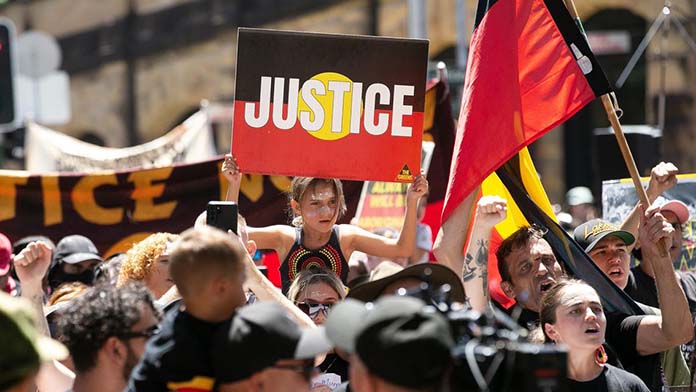The referendum on constitutional recognition of Indigenous people through a Voice to Parliament has been comprehensively defeated, with the Yes campaign failing to win a single state and a national tally settling at 61-39 for No.
For months, Aboriginal people have had to endure a bruising public debate saturated with racism, with many facing racist threats and abuse. Even though the polls indicated that the referendum was going down, the news of such a comprehensive defeat has led to widespread pain and despair.
Peter Dutton and Jacinta Price have been emboldened by the success of their racist campaign. Dutton disgracefully used his speech on Saturday night to call for a royal commission into child sex abuse in Indigenous communities, reinforcing the same baseless, racist slander that justified John Howard’s draconian NT Intervention in 2007.
Responsibility for this referendum disaster, however, lies at the feet of Anthony Albanese and the entire strategy of pursuing tokenistic constitutional recognition.
In March this year more than 60 per cent of the population were inclined to vote Yes, indicating the widespread sentiment for Indigenous rights.
But as soon as the Voice was questioned, most significantly by Dutton backed by conservative Indigenous figures like Price and Warren Mundine, the opinion polls started falling.
The opposition to the Voice from the progressive No advocates like Lidia Thorpe, and Michael Mansell, exposed the hollowness of the Voice and by revealing some of the divisions in the Indigenous community influenced die-hard supporters of Indigenous rights to hold back from the Yes campaign.
Little on offer
On the night of his election, Albanese thumped the podium, promising to “implement the Uluru Statement from the Heart in full”.
But when the Coalition went on the attack, saying the Voice was a step towards Treaty-making, the clear demand of the Uluru Statement, Albanese insisted the Voice had “nothing to do with a Treaty”.
Rather than defend the rights of Indigenous people to self-determination, Albanese constantly emphasised that parliament would not have to listen to the Voice.
As he put it repeatedly in the days leading up to the vote, “It’s simply a non-binding Advisory Committee.” He even insisted his government would ignore any advice to move national celebrations from 26 January.
The more Albanese attempted to bolster support for the Voice from the Mining Council and likes of Qantas boss, Alan Joyce, the more dubious the referendum became. Corporate endorsement sapped enthusiasm instead of boosting it.
When conservatives argued for practical measures to improve the lives of Indigenous people, the Yes campaign had no answer. Labor has been in power for 18 months and done nothing about Indigenous disadvantage or the power of mining companies fracking on Aboriginal land. The Yes campaign was reduced to saying the answer was the Voice.
The big majorities for Yes among the regional and rural Aboriginal communities reflect their crying need for practical help.
Marcia Langton, one of the central advocates of the Yes campaign, wrote a counsel of despair in The Saturday Paper, saying the referendum was, “the last best hope for a lasting settlement” and that a Yes result would see, “A nation blessed with an Indigenous heritage spanning 60 millennia, a British democracy captured in its Constitution and a multicultural unity that is a beacon to the world.”
But “being in the Constitution” was never going to deliver land rights, houses, jobs or anything else. And over and over again the Yes campaign emphasised that the Voice would not actually do anything except “advise”.
The tragedy of the referendum is the Yes campaign had no answer to Dutton’s racism and no explanation of how the Voice was going to rectify the consequences of Indigenous dispossession and the on-going racism reflected in the brutality of the police, the levels of incarceration and Black deaths in custody.
Those that saw the Voice as the last best hope are understandably despairing. It is indicative of the emptiness of the official Yes campaign strategy that their response to the referendum is to declare a week of mourning rather than take the fight to the Labor government.
Yet it is the government that can do something about jobs, education and housing and about land rights for Indigenous communities.
How are Yes campaigners going to take the fight to the mining companies and big business trampling on Indigenous rights when the Voice campaign has spent 18 months cuddling up to them?
Underlying racism
There is no doubt that the vote reflects a considerable underlying racism—some polls show there is a near majority of voters who believe that Aboriginal people don’t face discrimination. But the Yes campaign refused to take the racism head on—and indeed promoted the institutional agents responsible for it.
But the No vote cannot be simply explained by working class racism. The Yes campaign sowed confusion and demoralisation that hit the vote.
Importantly, there continues to be potential for an effective struggle for Indigenous rights.
Being the member of a union was one of the highest indications of voting Yes. There was a massive mobilisation of union members to canvass votes, leaflet railway station and staff voting booths.
Historically unions have been crucial to the struggle of Indigenous rights—from the Gurindji walk-off to the Jabiluka campaign. More recently unions have been an important part of the campaign against Santos fracking on Gomeroi land in northern NSW.
The referendum might be lost but real change was never going to come through that route. The real hope lies in the potential of Black and white uniting to fight for Indigenous rights and self-determination.
We will have to fight Labor, the mining companies and their racist system. In that sense, the referendum changes nothing.






